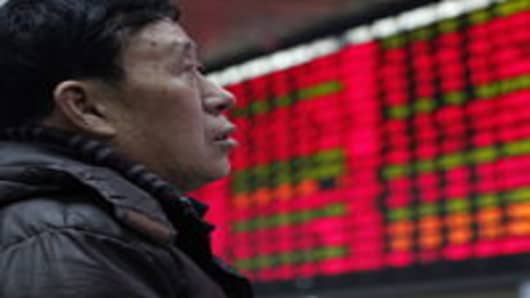China’s stock market soared on Friday, lifted by a double dose of good news both at home and abroad, but the rally of 4 percent is unlikely to mark the start of a turnaround for beaten-down Chinese shares, analysts told CNBC.
The rise was driven largely by the fact that Chinese regulators had given the go-ahead to 30 infrastructure projects, adding to 25 rail projects already approved this week, the official China Securities Journal reported on Friday.
The report estimated that the total amount of investment projects approved this week was above $157 billion — a sign that China is taking measures to stimulate its economy. This fueled a rally in Chinese machinery stocks, which contributed to the overall surge in Chinese equities.
Markets across Asia also got a boost after the European Central Bank outlined on Thursday a bond-buying plan to alleviate pressure on troubled euro zone states.
But China’s benchmark stock index outperformed its regional peers rising to its highest level in almost a month on Friday. This is notable given the drubbing it has taken this year — losing 13 percent since May — against the backdrop of a slowing economy.
“It looks like China is trying to get the economy back on track and that is helping sentiment in the stock market, especially since people had given up hope on any large-scale spending,” said Justin Harper, market strategist at IG Markets, in Singapore.
But analysts said Friday’s stellar gains were not likely to mark a turnaround for Chinese stocks — for this to happen China’s policymakers need to do more.
“We have a good backdrop for the stock market today, which is something we have not had for such a long time,” said Tim Condon, head of research for Asia at ING Markets. “But this is not the start of the stock market clawing back and it will be difficult for the stock market to break out to the upside until we see more easing from the central bank and that’s unlikely to happen until next year.”
The Waiting Game
Condon said there were two reasons why no monetary and fiscal stimulus is expected soon out of China.
The first was reluctance by China’s government to repeat the heavy spending of four years ago that triggered inflation and led to over investment in the property sector. The second is an upcoming change in the country’s leadership, with policymakers seen keen to hold off on making any major economic decisions until the transition is over.
Shane Oliver, head of investment strategy at AMP Capital in Sydney, added a third reason to remain cautious on the Chinese market — lack of clarity as to whether the reported spending on infrastructure projects amounted to new spending or just a reshuffling of existing plans.
“The Chinese share market is primed for action, so if China starts to ramp up stimulus spending, Chinese stocks should go higher, but I am cautious about whether China is relocating spending or announcing new plans,” Oliver said, adding, “we have had a false start before.”
A plethora of weak Chinese economic data over the past month triggered speculation that China would step in with both monetary and fiscal stimulus measures, but markets have subsequently been disappointed as China, until this week, remained silent.
China’s central bank has eased monetary policy by lowering reserve requirement ratios for banks three times since November 2011 and cutting interest rates in June and July.
“China has loosened monetary policy a little bit, but policy remains moderately tight, so that’s a big headwind for stocks to swim up against,” ING’s Condon said.
AMP’s Oliver adds that for the rally to be sustained “we want to see real stimulus and economic growth picking up.”
—By CNBC’s Dhara Ranasinghe


